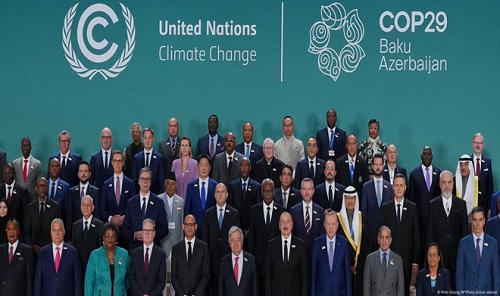
Countries worldwide struggle to generate wealth due to climate change, leading to decreased GDP and impacting national security and human rights. Climate change is already harming the environment, exacerbating desertification, biodiversity loss, and threatening global food and economic security, weakening economies.
The negative effects of climate change pose significant challenges, particularly for underdeveloped countries and the economic growth, natural resources, and human livelihoods of the African continent.
According to the World Economic Situation and Prospects (WESP) and the United Nations Economic Commission for Africa (UNECA) report, Ethiopia has faced severe droughts in recent years, resulting in widespread crop losses and a significant humanitarian crisis. These climate-related challenges are worsened by population growth, limited access to irrigation, and insufficient water management infrastructure.
Ethiopia, alongside other Eastern African countries, is feeling the impact of climate change. The increased frequency and severity of extreme weather events like droughts, floods, and heat waves are disrupting agriculture, water availability, and energy production.
In recent years, methane levels in the atmosphere have risen by roughly 2.5 times compared to pre-industrial times, with emissions continuing to increase according to some studies.
The UN World Meteorological Organization reports that coal mining contributes 12% of emissions in the fossil fuel industry, while oil and gas extraction, processing, and distribution account for 23%. Approximately 20% of methane emissions in the waste sector come from wastewater and landfills, with 32% of emissions in the agricultural sector from grazing livestock and manure, and 8% from rice farming.
Agriculture is a cornerstone of the global economy, employing a large portion of the population and significantly contributing to the world’s GDP. However, changing weather patterns and prolonged droughts have led to crop failures, reduced agricultural productivity, and increased food insecurity.
Reducing emissions is the quickest and most cost-effective way to slow global warming in the short term and is crucial to preventing severe climate damage.
To tackle these challenges, world leaders, decision-makers, researchers, and stakeholders convened in Baku, Azerbaijan. Ethiopia has participated in all COP conferences, including the recently held COP 29 in Baku.
The world needs concrete solutions from global actors and decision-makers in the climate sector, not just empty promises. The effects of climate change worsen yearly, claiming human lives and affecting the global economy. Urgent action is imperative.
The COP29 Declaration on Green Digital Action acknowledges the role of digital technologies in mitigating and adapting to climate change. Digital innovations can reduce greenhouse gas emissions and provide tools to inform and alert communities.
Africa raised concerns about the increasing impact of climate change at COP29, stressing the need for action over mere words. Claver Gatete of the UNECA emphasized the urgent requirement for increased climate financing and global cooperation to address Africa’s climate challenges.
Africa’s climate financing needs are estimated at $1.3 trillion, necessitating more climate investment and international cooperation to support the continent’s commitment to combating climate change.
As part of Africa, Ethiopia’s efforts in climate action are commendable, focusing on creating a green economy and investing in renewable energy sources. Developing countries investing beyond their economic capacity to combat climate change should receive support to promote and sustain their efforts.
The urgency of climate action and collaboration to secure Africa’s future in the face of climate change as it was highlighted at the COP-29.
Ethiopia’s ambitious development plans aim to become a middle-income economy while prioritizing investments in environmental protection and green economic development. The country’s industrial parks serve as examples of building a climate-resilient green economy.
Prime Minister Abiy Ahmed revealed that Ethiopia has planted 40 billion seedlings in the National Green Legacy Initiative to mitigate the global and national impacts of climate change. He emphasized Ethiopia’s accomplishments in achieving self-sufficiency in wheat and its efforts to develop renewable energy resources.
Finance is a key point of discussion at COP29, with developing nations needing support to combat climate change and transition to sustainable energy. The cost of inaction is high, underscoring the importance of fulfilling financial promises to secure a prosperous future for all countries.
The outcome of the UN Climate Change Conference COP28 in Dubai in December 2023 was hailed as historic by many. Almost 200 nations agreed on a roadmap for “transitioning away from fossil fuels.” UN Climate Change Executive Secretary Simon Stiell urged governments and businesses to translate these pledges into tangible outcomes without delay.
The NCQG, introduced in 2009, aims to collectively mobilize USD100 billion annually by 2020 for climate action in developing countries. The goal was met in 2022 when USD115.9 billion was raised. Negotiators at COP29 must increase the total amount of climate finance significantly, specify the timeframe and terms of its provision, outline the supported initiatives, ensure equitable distribution, and establish measurement criteria.
Initial negotiations have shown parties to be far apart. The Independent High-Level Expert Group on Climate Finance estimates that emerging markets and developing countries and need to invest up to USD2.4 trillion annually by 2030 to meet climate and nature goals. However, estimates vary widely, with the Intergovernmental Panel on Climate Change suggesting a range from USD5-9 trillion.
While it is recognized that the USD100 billion floors is inadequate, there is no consensus on the appropriate funding amount or contributors. Currently, only countries classified as developed in 1992 under the UNFCCC are obligated to provide climate finance to developing nations. However, the global landscape has evolved significantly since then; with countries are now being major emitters and economies.
The G7, comprising the world’s leading economies, is urging some countries to contribute to climate financing. Yet, differing perspectives persist, with recent talks failing to reach agreement. The UN has proposed seven options to bridge the gap between developed and developing nations.
Linked closely to climate finance negotiations is the establishment of the Loss and Damage Fund from COP28. This fund supports vulnerable nations facing climate challenges, a topic expected to progress at COP29.
Another critical issue at COP29 is finalizing efforts to operationalize Article 6 of the Paris Agreement, enabling countries to transfer carbon credits to help meet climate targets. However, implementing this mechanism remains unresolved.
The Baku conference will lay the groundwork for updating National Determined Contributions (NDCs) by February 10, 2025, aligning with the Global Stocktake’s call for substantial reductions in greenhouse gas emissions. Additionally, countries must accelerate climate adaptation efforts, with National Adaptation Plans due by 2025 and implementation progress by 2030.
The COP29 presidency urges developed nations to double adaptation finance by 2025 and increase contributions to funds like the Green Climate Fund and Adaptation Fund. The focus at COP29 is primarily on finance, recognizing it as a pivotal element in addressing climate challenges and ensuring a sustainable future for all countries.
BY FIKADU BELAY
THE ETHIOPIAN HERALD TUESDAY 19 NOVEMBER 2024





